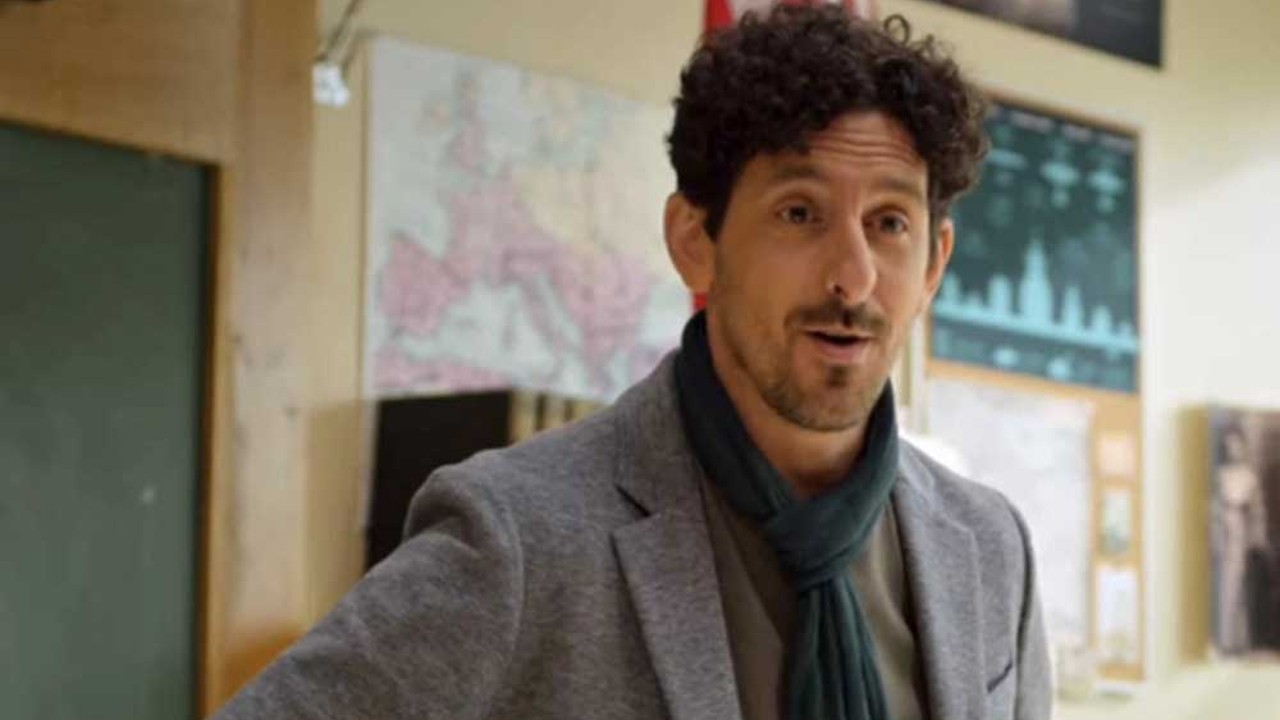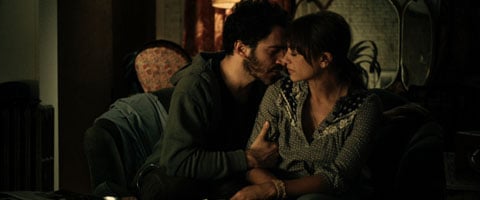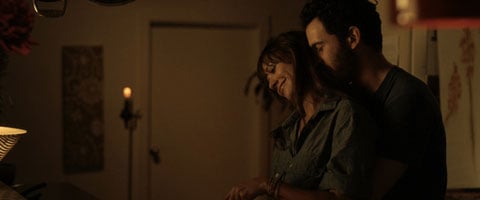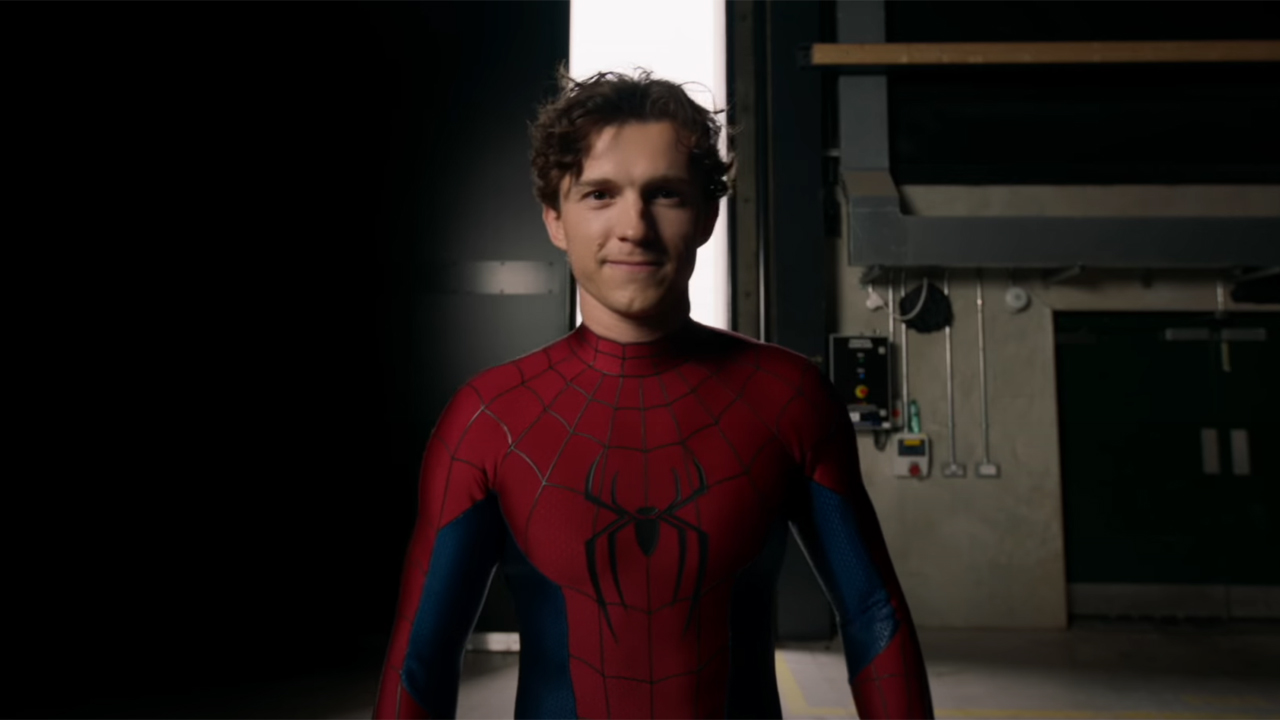Exclusive Interview: Monogamy Writer/Director Dana Adam Shapiro

Your Daily Blend of Entertainment News
You are now subscribed
Your newsletter sign-up was successful
When it comes to filmmaking, there are big differences between documentary and narrative. Both formats have both advantages and disadvantages, from multiple takes to casting, but they do have some similarities. Just as writer/director Dana Adam Shapiro. After making his documentary debut in 2005 with Murderball, he’s now set to release his first narrative feature, the romantic drama Monogamy.
This past week I had the pleasure of sitting down with Shapiro for a one-on-one interview where we discussed his newest project at length. Among our topics of conversation, we discussed what it was about Chris Messina and Rashida Jones that made them the perfect casting, creating and throwing away storyboards, and how he and his writing partner actually tried to make their protagonist as unlikeable as possible. Check out the interview below.
SPOILER WARNING: Some sections of this interview do contain spoilers regarding the plot and ending of Monogamy. These sections are clearly marked, but please read with caution. Enjoy!
This is your first narrative feature, but you did direct the documentary Murderball back in 2005. Obviously they’re separate worlds, but were you able to apply what you learned from that film while making Monogamy?
Yeah, so much. I think that even when it comes to actors, shooting a documentary is all about hanging back and listening and following the action and creating an environment. Trust, also, using natural light, being able to frame something on the fly. We tried to take a lot of those documentary aspects and use them to make this film. Murderball we tried to take a lot of narrative fiction elements and use them to make the movie. We shot it, cut it, scored it very interested in story structure and having things resolve, you’re always chasing those storylines. With this it’s almost like, “We’re going to make a documentary about this fictional couple.” So part of that is improvisational dialogue, some of that is real locations.
You said that you did some of it on the fly. Did you storyboard the film?
I read so many people who said, “I storyboarded and then I got to set and I threw it all away.” And then I did the exact same thing. Because, first of all, it’s idiotic to storyboard before you’ve done your location scouting. You can have a general idea. There’s a few things that were storyboarded that actually stayed. For instance, the final scene where she comes down the stairs – the window and the staircase where you see her legs first – that was the guiding line for the location. We have to have a place where there’s a window that he can look through and there’s a staircase. So that was something that we went for from the storyboard.
Your Daily Blend of Entertainment News
One benefit that you get from shooting narrative versus documentary is that you can use multiple takes. Was that something you took advantage of?
Absolutely. You live in fear of losing it in a doc, because you can’t really say, “Can you do that again?” You can in an interview, but for the vérité stuff, or the stuff that happens… What I live in fear of Monogamy, I didn’t want to do any rehearsals on this because my fear, coming from documentary, is that something would happen in a rehearsal and I’d spend the rest of the day trying to get it. So I’d just be like, “Let’s shoot the rehearsal. Let’s just shoot everything.” And that was one of the advantages of shooting on the Red Camera, that we could just shoot and shoot.
When it came to casting Theo and Nat, what were the qualities that Chris Messina and Rashida Jones had that let you know they were the right actors for the parts? Obviously Rashida has a beautiful singing voice, but what elements were you looking for while casting these parts?
When you’re making a movie about a couple the most important thing is chemistry between them. The girl had to be incredibly attractive, otherwise the story wouldn’t work. If he was married to a very unattractive girl the stakes aren’t as high. You want the guys in the audience to be like, “What are you, nuts? Look at that girl!” If you don’t have that, the story becomes a different story. Maybe it’s a better story, I don’t know, but it’s a different story. The idea is that we had to cast something of a dream girl, and Rashida Jones is a dream girl. She has everything – she can sing and she’s cool and she’s pretty and she’s smart. But the most important thing was chemistry and Chris and Rashida actually knew each other. So they had that lived in quality that was necessary for this couple because we’re really dropping you into this film, we don’t tell you how long they’ve been together, but you have to know just by watching them cook dinner that they have been together for years. He goes to kiss her and she pulls away a little bit. Just the little things. Anyone who has been in a long term relationship and sees the luster kind of fade a bit will be like, they’re best friends, but the sex isn’t like what it used to be and that’s obviously a huge problem for him.
Did you screentest them together?
No.
You just kind of eyeballed it then?
It was gut. I mean, it wasn’t gut in the sense that they were bigger than their credits and who they were. They were bigger than I’d ever thought we’d get. We were prepared to make the movie for $40,000 with our friends. So when we got Chris and when we got Rashida I would never have insulted them. I was jumping up and down that we got them. So there was no screentest. I had to speak to them about their relationship because, like I said, they were friends. “Is it going to be alright? You’re friends with his girlfriend…” And that, I thought, really added to it, because it is a movie about a couple who have become best friends and in the process have lost some of that romance. So they had some of that already.

Going further with that idea, I love that this movie doesn’t treat relationships and romance in the typical puppies and rainbows way that Hollywood typically does and instead goes for the realistic approach. During the writing process was that your main focus?
Well thank you, first of all, because that’s what we were going for. Always when Evan [M. Wiener] and I were writing we always used the phrase, “We have to keep it on the ground.” If it ever gets off the ground and it becomes too genre or too rom-com or too thriller – any time it feels like a movie we would kind of reign it back. We want this to feel like it could happen to the guys sitting in the audience. It’s just extraordinary enough to be like, “Whoa, this is an interesting ride,” but not too extraordinary to make you go, “Come on! That’s ridiculous.” So we talked about a lot of different things at the beginning, and we liked this idea of this character being a photo stalker. The first idea was this woman calls him and says, “I’ll be on the Brooklyn Bridge,” and he goes, “Okay,” goes on the Brooklyn Bridge, she’s standing there, and she jumps off. And we’re like, “That’s a cool opening!” But then we were like now we’re making a real Hitchcock movie or something and we wanted to make a movie about relationships. We just had to find a way to make a movie about relationships that we could put on rails, that we could add the DePalma aspect to, one of these European genre movies.
It’s funny you should say that, because there are definitely parts in this movie that reminded me of Michelangelo Antonioni’s Blow-Up or DePalma’s Blow Out. Did either of those films play as inspiration while you were making this film?
Yeah, yeah, certainly the blow-up scenes in Blow-Up. Blow Out I’ve actually never seen, but Body Double, Dressed To Kill, that kind of pulpy, sexy, vampy thing that he’s good at. The blow-up sequence when he’s blowing up the thing, yeah.

Continuing with talking about the development of the story, I wanted to ask you about the character of Theo. While he isn’t a completely despicable character, he does often make poor moral decisions that hurt the people around him. While writing the script, did you feel you had to make sure that audiences could still root for him?
No, we did the opposite. Writing a sympathetic character is death by numbers. It’s really easy. Someone’s mother is sick and they need to get the money for the operation, so anything they do is excused because they’re putting another person before themselves and they’re acting honorably, so we’ll root for them. Let’s make a character that exhibits the foibles that we all exhibit when we’re acting badly that we’ll relate to and learn from, and leave the theater not saying, “I want to be like him,” but, “I want to be better than him.” So we were very interested in the moments when we act small, when we act petty, when we act jealous, because we all do act like that. Movie heroes can be great, but we were more interested in an anti-hero.
START SPOILERS
Someone who is tripping, and who ultimately learns the errors of his ways, although in this movie perhaps it’s too late. He doesn’t get the girl, so to speak. And maybe he shouldn’t. Or maybe he should! I find it interesting, you can have a character act despicably in a Hollywood movie, and give him that redemption scene, give him the speech, and we’ll root for him in the end. And I remember asking at a thing, “How many people want them to get back together?” and 50% of the people raised their hands, and then another 50% say they don’t. But then you ask, “How many people want Julianne Moore and Annette Bening to get back together in The Kids Are All Right?” Everybody! She cheated on her! With a guy! The worst person in the world in the context of their relationship, such betrayal, and everything’s forgiven. This guy didn’t cheat on his girlfriend. He didn’t fuck some girl. Yeah, he acted badly, but is it so bad that half the audience is going to go, “He’s the worst person ever.” And the moment that a lot of people say is like, “When he tried to have sex with her in the hospital, that was it.” Guys, can I ask you a question, please? Would any of you be even remotely offended if your girlfriend wanted to give you a blowjob in the hospital? Even if you didn’t want to it’d be flattering, certainly not offensive.
END SPOILERS
Have you noticed a difference in reaction to the movie between male and female audiences?
Yeah…it’s weird, every time I say “Yeah” then I read something from someone. I was going to say women, like a little bit older, tend to respond to it the best. If I had to say – women in their 30s? But it seems like you like it, so no, I wouldn’t say. There’s a certain type of 20-something guy who hates it and I don’t know why, but like a young guy. If there was one category, if I could say there’s one it would be a 20-something guy. Like a white kid hipster from Brooklyn. “I listen to Albert Ayler and only read [Thomas] Pynchon.”

Speaking of Brooklyn, this movie won Best New York Narrative at the Tribeca Film Festival, and captures the city very well, but was this always planned as a New York story?
I think being single in New York is a unique thing. If you’re making a movie about being single and commitment and real estate in New York is a big factor in people’s relationships – people move in together not necessarily because they feel like moving in together.
They do it because of rent!
Sure! There’s a rubbernecking quality to New York, not that you’re looking at car wrecks, you’re looking at beautiful women or beautiful men, or people that look cool or… there are so many smart, pretty, interesting people in New York, so being single there, or consequently, additionally be engaged there, is a different type of thing. So we wanted to make a New York film, wanted to make a Brooklyn film. A real Brooklyn film – we didn’t want to make one of these movies about suspended adolescence and wearing ironic t-shirts and eating cereal out of Tupperware and saying, “I just want to live with my buddies.” I like those movies, I like those movies a lot, but we were trying to make a movie about guys who are a little bit older; who are divorced; who have children; who are married and going to see therapists; who are trying to lead productive adult lives – even if they’re failing. The world in it was just a little bit older.
I thought the addition of Theo’s friends at the bar was a great touch, kind of showing the path that Theo was headed down.
That guy, in addition to being a great actor, is a bartender at that bar, at the Brooklyn Social, which is where I used to drink for three years when I lived in that neighborhood. And that scene on the roof is something that I think is great. I think it’s a moment where we’re really telling the audience that we don’t endorse this behavior. When Will, the one that Theo really looks up to, is like, “What are you doing?” and then later in front of the computer, “What are you going to do? Are you going to stalk this woman?” And then the dog leaves him. Every sane person is like, “You’re going down a wrong path, man.” And so that’s why I found it interesting when people think we wrote this and “Well, we didn’t sympathize with him.” We put all of these people in the movie who are supposedly surrogate audience members and also speaking for us. We don’t endorse this behavior!
START SPOILERS
He doesn’t get the girl at the end! Or maybe he does, but he had to go through hell to get her if he does.
I found it interesting that you’ve said that you don’t think they get back together at the end. You talk to so many writers and directors who are always so ambiguous about it, but it’s refreshing that you take a side.
Yeah, I think she’s going to say no. Well, I think that he might say no, because even if she allows him to have one more shot, if she doesn’t want to have sex with him… Look, man. If you don’t have a successful relationship before, the honeymoon has to at least last through the honeymoon. The honeymoon phase better last through the honeymoon or you’re in trouble. I think that’s a fact.

In addition to the future being up for debate, another element in this film that can be argued is if Theo actually cheated on Nat. When you hear the title Monogamy it’s funny how quickly your brain goes to adultery.
It’s an interesting idea of adultery in the head, can that be as bad as adultery in the bed? And Eyes Wide Shut was all about that. She never cheats on him, but she says, “I would have,” and that slays him. That’s enough to send him down as fucked up of a rabbit hole you’ll find. So this idea of adultery in the head – did he cheat on her? No. Is he an asshole? Yeah. I think that’s an interesting thing, and it brings it back to the metaphor of the staph infection where the littlest thing can blow up and become all consuming, whether it’s a wound or just a thought. And he just couldn’t get that thought out of his head in Eyes Wide Shut.
Monogamy, also, when you open the movie, there’s something foreboding about it. It feels like not something you want. And then at the end, here he back and it becomes that which you do want. So the title changed definition over the course of the movie, just like the song. It started out as a love song, it became a break-up song. But yeah, when you hear that title, Monogamy, it’s weird that our mind goes, “Oh, this is a movie about adultery,” or “This is a movie about a couple that doesn’t work out.”
END SPOILERS
Is this a personal story? Where did this story come from in you?
Well, I’ve been doing a divorce book for years, I interview people who have been divorced and a lot of the things that they bring up is the difficulty in maintaining an active sex life in a long-term relationship. So that was kind of the central thing: how do you maintain a sex life in a long-term relationship in 2011? That was an interesting topic. I came across an article about a photo stalker, someone you hire to shoot you on the sly, and I thought that was really interesting. So I called Evan, who I wrote the movie with, and I remember forwarding it to him and saying, “What do you think about this as a character?” And he was like, “It’s great! Let’s go get a drink! Let’s talk about it.” And writing a screenplay, it was like, “Okay, what’s going to happen next? Okay, what should happen next?” That’s all it is, just sitting there saying “What should happen next.” And we wrote it pretty quickly. We’ve written three scripts together and this one was the fastest.
What else are you working on now? Do you know what your next project is going to be?
I’m going to finish this divorce book, and then Evan and I are writing something and I’m working on something else. You have to juggle. Someone told me a story back at Sundance in 2005 after Murderball, they said, “What are you doing next?” and I said, “Oh, I’m going to direct The Every Boy, my novel was just optioned.” And he goes, “No you’re not.” And I said, “No, I am. I just had a meeting.” And he was like, “Look, maybe you are, maybe you’re not. The chances are you’re probably not, just because in this town very little actually happens and if it does it takes seven years. So my advice to you is don’t count on anything. You really have to have a lot of plates spinning to make things happen. If you put all of your eggs in one basket then you’re going to crash.” And it was the best advice, because here we are, it’s six years later and the movie isn’t made. It’s tough, I’m trying to juggle a bit. The stuff I make tends to always be on spec. You write a screenplay it’s on spec. Murderball we shot for a year on spec, and then you hope to bring it to market and sell it, but it’s a tough grind.

Eric Eisenberg is the Assistant Managing Editor at CinemaBlend. After graduating Boston University and earning a bachelor’s degree in journalism, he took a part-time job as a staff writer for CinemaBlend, and after six months was offered the opportunity to move to Los Angeles and take on a newly created West Coast Editor position. Over a decade later, he's continuing to advance his interests and expertise. In addition to conducting filmmaker interviews and contributing to the news and feature content of the site, Eric also oversees the Movie Reviews section, writes the the weekend box office report (published Sundays), and is the site's resident Stephen King expert. He has two King-related columns.
